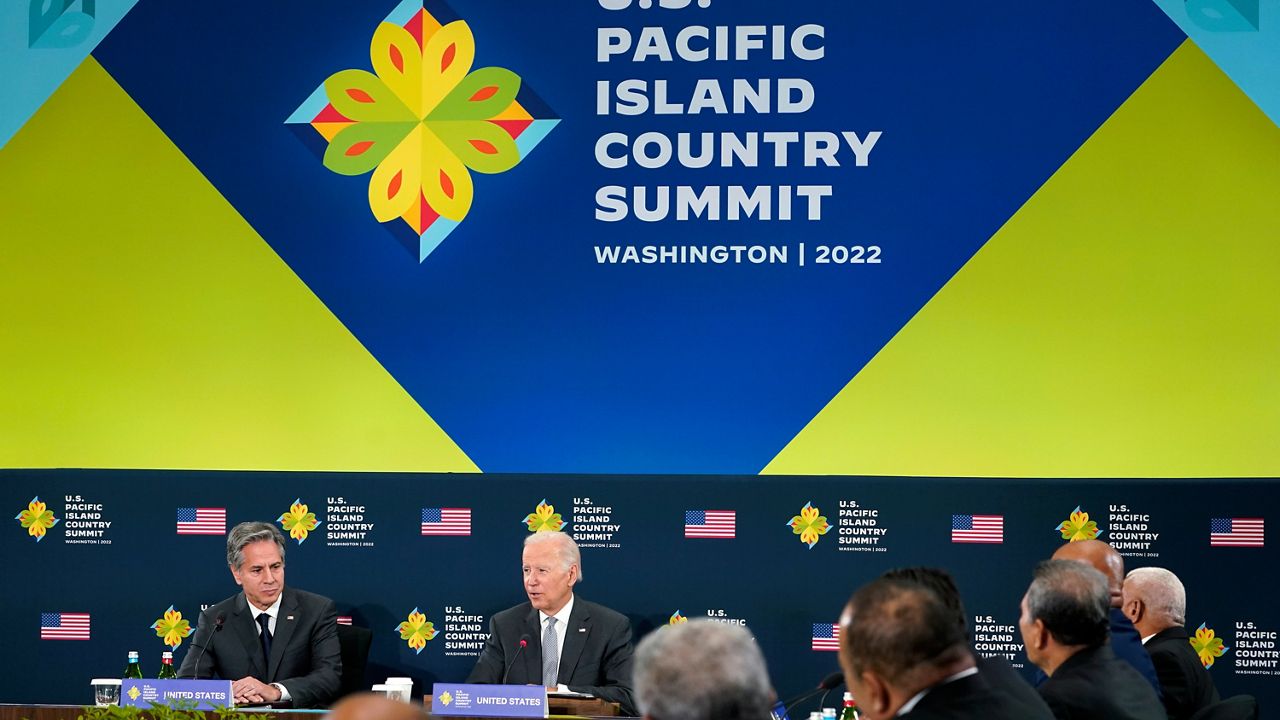The Biden administration is trying to build what it calls a new “strategic partnership” with more than a dozen Pacific Island nations to fight climate change and counter China’s growing military and economic influence in the region.
As a first step, the administration last week held the first ever United States-Pacific Island Country Summit, inviting leaders of the Pacific Island nations to the White House.
“Today, security in the Pacific and for the Pacific Islanders remains as critical as ever to us and I hope to you as well. To secure the security of America, quite frankly, and the world depends on your security and the security of the Pacific Islands,” President Joe Biden told attendees at last week's event.
The two-day summit concluded with a “Declaration on U.S.-Pacific Partnership” with Pacific Island countries, including Fiji, Samoa, the Solomon Islands, Marshall Islands, French Polynesia, Micronesia and Papua New Guinea. As part of the partnership, the U.S. will take on several financial commitments, including providing more than $800 million in new aid to participating countries.
Experts say the agreement can help the U.S. to reassert its influence in the region.
“For years, the Pacific Island region suffered from strategic neglect from Washington and others, and Beijing has stepped into that strategic vacuum, moving to increase its influence and project its power across the region,” Charles Edel, Christopher Johnstone and Gregory Poling with the Center for Strategic and International Studies, told Spectrum News.
Earlier this year, U.S. officials and allies became concerned after the Solomon Islands signed a security agreement with China, which raised the possibility of a Chinese military presence on the islands, a move that would drastically increase tensions in the area.
In April, the Prime Minister of the Solomon Islands, Manasseh Sogavare, dismissed those concerns and he was among the leaders at last week’s summit to sign onto the declaration.
House Speaker Nancy Pelosi, D-Calif., Secretary of State Antony Blinken and U.S. Commerce Secretary Gina Raimondo were among the U.S. officials to take part in the conference. During an event at the State Department, Blinken said the summit was the result of meetings held with leaders across the globe.
“Many of us were together at the Partners of the Blue Pacific Ministerial meeting that we hosted last week in New York on the margins of the U.N. General Assembly," Blinken said. "We brought together countries around the vision that you and others set out in the 2050 Strategy for the Blue Pacific Continent."
Rep. Ed Case, a Democrat from Hawaii who was also involved in the summit, held a meeting with the president of the Republic of Palau.
“Honored to host Republic of Palau President Surangel Whipps Jr. in my Capitol Hill office to compare notes on a successful first-ever D.C. summit of Pacific Island nations to reforge a partnership that has endured for three generations now to the benefit of all of the Pacific, our country and our Hawaiʻi,” Case wrote on Twitter.
Members of Hawaii’s congressional delegation have been among the most vocal advocates of efforts to enhance U.S. presence in the Pacific Island region.
In May, Sen. Mazie Hirono, D-Hawaii., jointly introduced legislation with Arkansas Sen. Tom Cotton to study “the feasibility of creating new U.S. diplomatic posts in Pacific Island nations and territories that do not currently have U.S. embassies.”
"A stronger U.S. diplomatic commitment to the region would simultaneously help to counter China’s growing presence there," a press release about the bill reads.
“For various reasons, the U.S. still does not have a permanent diplomatic presence in many of these nations," Hirono wrote in a statement in May. "Expanding our diplomatic presence in the Pacific would benefit the United States, host countries, partners and allies, and U.S. citizens living and traveling in the region."
The bipartisan bill was co-sponsored by Sens. Ed Markey, D-Mass., and Bill Hagerty, R-Tenn. There has been little movement on the legislation.
Out of the summit came a decision from the White House to name Ambassador Frankie Reed, the former envoy to Fiji, Kiribati, Tonga, Nauru, and Tonga, as the first-ever U.S. Envoy to the Pacific Islands Forum.
“In this new capacity, the Ambassador will expand U.S. ties and coordination with the Pacific Islands Forum and its members,” the White House said.
The declaration includes 11 objectives that range from U.S investments to address climate change in the Pacific, efforts to bolster the Pacific Islands’ ability to detect and respond to devastating natural disasters and establishing a “Trade and Investment Dialogue with the Pacific Islands” to promote trade.
Also outlined in the declaration are plans for the State Department to partner with the U.S. Coast Guard to provide over $3 million to enhance U.S. Coast Guard training and capabilities in the Pacific Islands. For more than a half-century, Hawaii has been home to U.S. Pacific Command, which includes representatives of the U.S. Army, Navy, Marine Corps, Air Force and Coast Guard.



